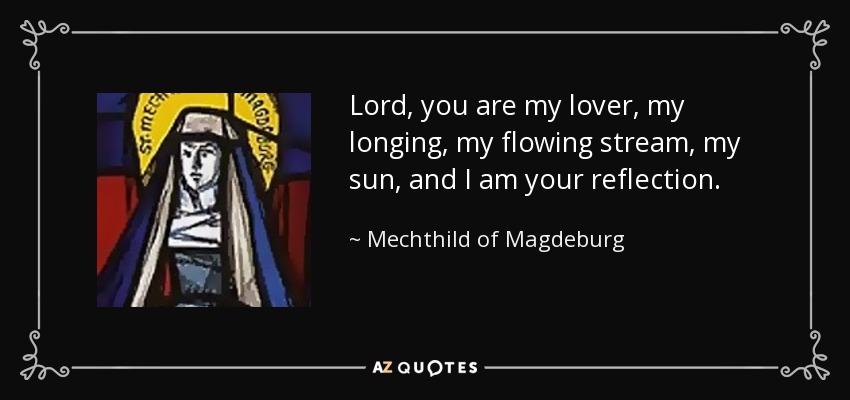"I am poured out like water, and all my bones are out of joint; my heart is like wax."~ Psalm 22:14
 |
| A drawing of a Beguine from Des dodes dantz, printed in Lübeck in 1489. (source) |
"The Beguine movement was a lay woman's movement that arose in the early 13th century. The Beguines did not follow any established rule, but lived lives of apostolic poverty and chastity, doing works of charity among the poor and sick.
This style of life led to a spirituality that was both in and out of this world, using rich and captivating imagery. They tried to capture the longing and love for the Other through their use of everyday experiences."
In the history of the Church there have been three types of spirituality. The first is Monastic, the kind that Church fathers said could only exist in the desert with proper time for prayer and contemplation. You could only get to God if your prayer was constant. The requirements promised union with God but only after years of constant devotion. The common person couldn't approach this difficult lifelong commitment.
The second type of spirituality is Scholastic Theology. This is the use of reason and philosophy to find your way to God. St. Thomas Aquinas' Summa Theologica is an example of this. We use reasons and proofs to experience God. Until the 1950's this was the primary theological source for anyone who wasn't monastic. The Baltimore Catechism was a product of this, as well as the theology of Fulton Sheen. Scholastic Theology was popular in a masculine dominated Church as it was a problem-solving approach. A personal relationship with God was not considered.
Vernacular or Common Spirituality is the third type of spirituality which accents personal relationship with God through our daily lives and sees nature as a sign of God's love for us. The fact that we can learn compassion and good acts is feminine in its foundation and is championed by most female mystics. It flourished in homes among spouses and in churches. Here we seek union with God through private piety.
Vernacular Spirituality offered the possibility of achieving spiritual union with God to anyone in any walk of life. This spirituality was supported by local clergy who saw a need for spirituality for the common people. This male-dominated society where women were to be obedient was now Christ dominated. A popular example of this was championed by St. Bernard of Clairvaux in the 12th century who added another dimension to our view and image of God. Here God was seen not as a King or a Judge but now a Lover and a Bridegroom. Sin was felt to be a betrayal. We are the Lover and Jesus is the Bride. You prepare yourself for the kiss of Christ. This nuptial mysticism was foreign to the clergy of that time.
At the same time this idea of God as a Lover and a Bridegroom was expressed in the Beguine Movement. Some people have thought of the Beguines as heretical. It was the first European women's lay religious movement incorporating a life of prayer to draw closer to Christ. Women could be married, widowed or single. No vows were taken with the exception of an informal vow to remain celibate but this had no obligation attached to it.
The Beguines originated in Germany and France. The women lived lives of charity and poverty and included both private prayer and corporate worship. Several women had a personal, mystical union with Christ. They did not write about God in an abstract sense; it was personal and much of the writing was romantic. Many of these mystics are totally unknown to us.
"God leads his chosen people along strange paths."
~Mechtild of Magdeburg
 |
| Mechtild of Magdeburg |
One of these mystics whose words have been passed down through the centuries was Mechtild of Magdeburg who wrote the book "The Flowing Light of the Godhead" on courtly love with common sense. Her book identifies daily tasks that can be used to serve God. She talks about God walking with us in our daily lives. It is often through suffering that love is defined and deepened. Our greatest joy in heaven will be the love of God's will. Here we will be one with God and will delight in his will. Everything you do can be transferred into joy. Suffering elevates you to God. We wear everyday work clothes when we're well but wear brides clothes when we are ill because our illness unites us to God.
Our longing for God is a hunger, thirst, ache, excitement. We are all made for union with God. Our nature is to be one with God. Suffering and love are intimately tied together as seen in childbirth and parenting. We are ever-longing in soul and ever-suffering in body. Small sins harm perfection. What often impedes our spiritual life is that we pay no attention to our small sins. But little daily efforts reveal the joys and love of God. We aren't asked to become cloistered but to do small things with joy as echoed by St. Therese of Lisieux and St. Teresa of Calcutta. Even small acts of compassion cleanse our souls.
Each day we should say, "Jesus, my love, what do you want of me today?" and then say it the next day and the day after that.
For more details about Mechtild of Magdeburg with links to some of her beautiful poetry visit this website.
 |
| source |
No comments:
Post a Comment